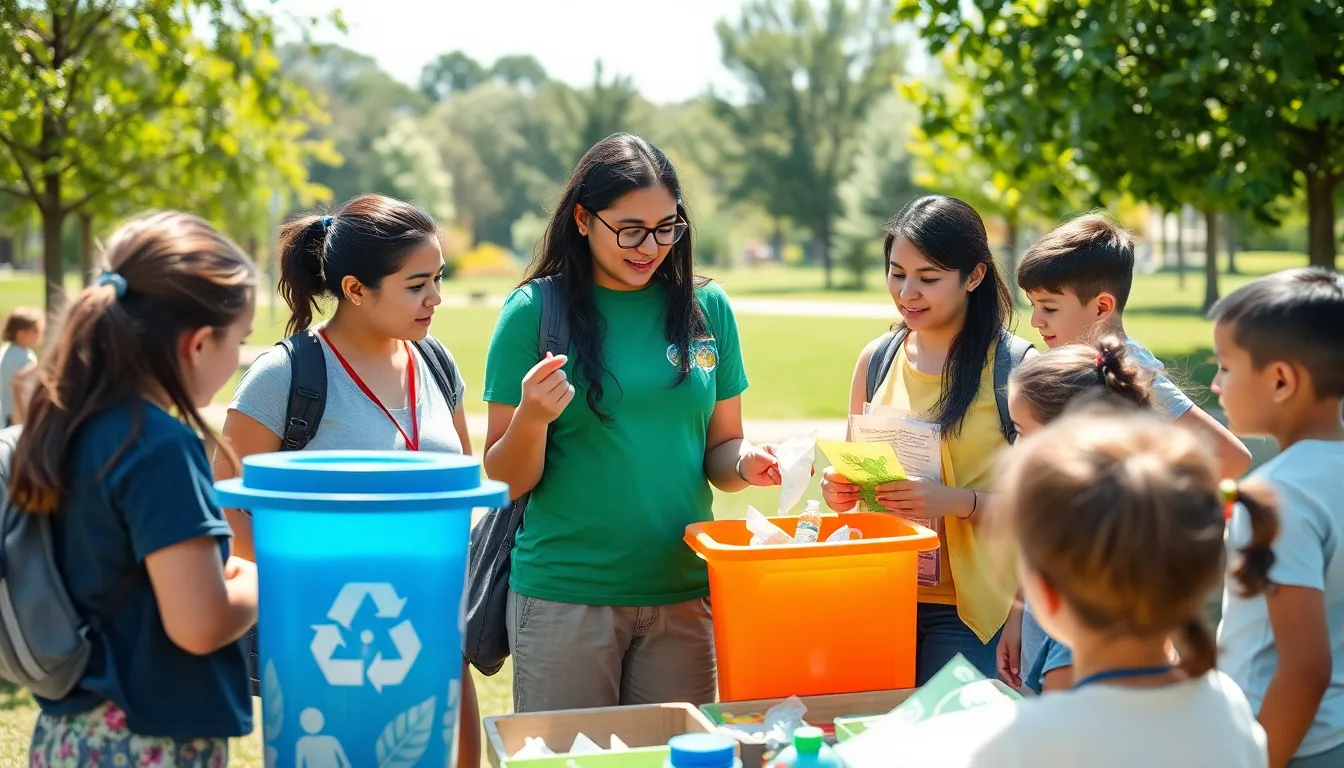In a world where climate change feels like that stubborn stain on your favorite shirt, environmental education associates are the superheroes we didn’t know we needed. Armed with knowledge and a passion for the planet, they tackle everything from recycling practices to sustainable living. They’re not just teaching; they’re inspiring a new generation to care about Mother Earth—one fun fact at a time.
Table of Contents
ToggleWhat Are Environmental Education Associates?
Environmental education associates play a vital role in promoting sustainability. These professionals possess expertise in environmental science and education, allowing them to convey complex concepts in relatable ways. Often working in schools, community centers, or nature conservancies, they develop programs that engage learners of all ages.
Through workshops and hands-on activities, environmental education associates foster awareness of key issues such as recycling, conservation, and climate change. They emphasize the importance of individual actions in protecting the environment. Educators collaborate with local organizations to create initiatives that encourage community involvement.
Associates often utilize diverse teaching methods, including outdoor experiences and interactive lessons, to captivate audiences. They design curricula that meet educational standards while highlighting real-world implications of environmental challenges. Training volunteers and community leaders is another significant aspect of their work, ensuring a broader impact on environmental stewardship.
Networking with other environmental professionals further enhances their effectiveness. By sharing best practices, associates contribute to a collective knowledge base aimed at fostering sustainable habits. Continuous professional development keeps them updated on the latest environmental issues and educational strategies.
Environmental education associates serve as crucial agents of change, guiding individuals and communities toward a more sustainable future. Their dedication to educating and inspiring fosters a culture of environmental responsibility that transcends generations.
Importance of Environmental Education

Environmental education plays a crucial role in shaping sustainable communities and fostering environmental responsibility. Education associates impact individual and collective actions by providing essential knowledge of environmental issues.
Promoting Awareness
Promoting awareness of environmental issues begins with effective communication. Environmental education associates develop engaging programs that highlight topics such as climate change, conservation, and biodiversity. Through workshops and hands-on activities, they provide learners with valuable insights. Associating complex concepts with everyday experiences makes these issues relatable. Community involvement enhances the reach of their initiatives, as they partner with local organizations. Diverse teaching methods, such as outdoor experiences, ignite curiosity and encourage exploration. Increased awareness leads to informed citizens who understand their role in environmental stewardship.
Encouraging Sustainable Practices
Encouraging sustainable practices is vital in minimizing environmental impact. Education associates facilitate the adoption of eco-friendly habits through various strategies. They design curricula that emphasize practical action, such as recycling, reducing waste, and conserving water. Offering solutions tailored to local contexts helps communities integrate sustainable practices into daily life. Training volunteers and community leaders expands the influence of these initiatives. Promoting sustainable behaviors fosters a culture of responsibility among individuals. The result is a more environmentally conscious society equipped to address future challenges.
Roles and Responsibilities of Environmental Education Associates
Environmental education associates play a vital role in promoting environmental awareness and sustainability. Their work involves various aspects that contribute to community understanding and engagement.
Curriculum Development
Creating effective curricula is a fundamental responsibility. Environmental education associates design programs that align with educational standards and address environmental challenges. Tailoring content for different age groups ensures relevance and engagement. They incorporate hands-on activities that simplify complex topics, making learning enjoyable. Resources like multimedia presentations enhance the educational experience. Integration of local environmental issues into the curriculum fosters a deeper connection with the community. It encourages students to apply their knowledge to real-world scenarios.
Community Engagement
Fostering community involvement is essential for environmental education associates. They initiate partnerships with local organizations to develop collaborative initiatives. Strategies often include workshops, events, and outreach programs that inspire participation. Associates interact with diverse audiences, ensuring inclusivity in their approach. Communication of environmental issues occurs through various channels, enhancing public awareness. Utilizing social media and community newsletters amplifies the reach of their messages. Encouraging volunteer involvement strengthens community ties and promotes a collective effort toward sustainability. The result is a more informed public actively participating in environmental stewardship.
Skills Required for Environmental Education Associates
Environmental education associates require a diverse set of skills to effectively engage learners and promote environmental awareness. Key skills include communication and analytical abilities.
Communication Skills
Effective communication stands at the core of an environmental education associate’s role. They must convey complex environmental concepts clearly to diverse audiences. Utilizing various communication channels enhances engagement among community members. Active listening is crucial, as it allows associates to respond to questions and adapt their messaging. They often tailor information for different age groups, ensuring that everyone can appreciate the subject matter. Facilitating discussions and workshops encourages community participation, reinforcing collective goals for sustainability.
Analytical Skills
Analytical skills enable environmental education associates to evaluate environmental issues critically. Assessing data and research empowers them to develop relevant curricula. They analyze the effectiveness of educational programs through evaluations and feedback. Understanding local environmental challenges allows them to create targeted initiatives. Identifying trends in community involvement helps refine outreach strategies. Environmental education associates often utilize research findings to support their advocacy efforts effectively. Strong analytical capabilities foster informed decision-making and guide their educational approaches toward tangible outcomes.
Career Opportunities in Environmental Education
Various career paths are available within environmental education, reflecting the growing demand for sustainability advocates. Positions include environmental educators, program coordinators, and curriculum developers, requiring distinct skills and expertise.
Environmental educators work in schools, nature centers, and community organizations, leading workshops and programs focused on sustainability. Program coordinators manage initiatives that promote environmental awareness while engaging diverse audiences.
Curriculum developers create educational materials that meet state standards and address local environmental needs. They collaborate with educators and community leaders to ensure relevance and effectiveness in teaching.
Many environmental education associates expand their careers into leadership roles. These positions may involve overseeing educational programs, managing budgets, and leading teams dedicated to environmental stewardship. Opportunities exist in non-profit organizations, governmental agencies, and private enterprises.
Job listings often highlight desirable skills such as strong communication and analytical abilities. Excellent communication fosters connections with various audiences, making complex topics more relatable. Analytical skills enable professionals to evaluate environmental data and track community engagement trends.
Networking plays a vital role in these careers. Associations and conferences provide platforms to connect with like-minded individuals and learn about best practices in environmental education. Furthermore, volunteering for local environmental initiatives expands practical experience and enhances career prospects.
Finally, continuing education can enhance professional development. Pursuing certifications or advanced degrees in environmental science or education often leads to better opportunities and increased knowledge in the field. Environmental education associates contribute significantly to environmental awareness, guiding individuals and communities toward sustainable practices.
Environmental education associates play a vital role in shaping a sustainable future. Their dedication to fostering awareness and promoting eco-friendly practices empowers individuals and communities to take meaningful action. By developing engaging curricula and facilitating hands-on learning experiences, they make environmental issues accessible and relatable.
As they continue to inspire the next generation of environmental stewards, the impact of their work extends far beyond the classroom. Through collaboration with local organizations and innovative outreach strategies, these associates strengthen community ties and encourage collective responsibility. The growing demand for their expertise signals a promising future for environmental education, ensuring that the message of sustainability resonates for years to come.


